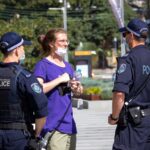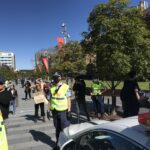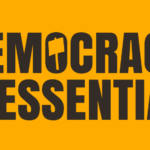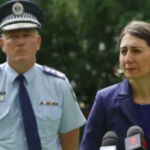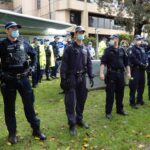“A Blatant Attempt to Repress Protests”: An Interview With Sydney Uni Arrestee Adam Adelpour
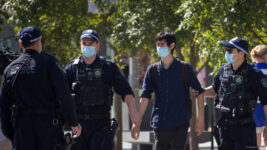
The NSW Liberals and ailing Nationals government announced on 17 September that in a fortnight’s time it would be allowing crowds of up to 40,000 people attend stadium events, as the owners of these venues have provided detailed COVID Safe plans designed to prevent virus transmission.
“Our number one priority is the health and safety of the people of NSW, however it is no secret we’re also focused on firing up the economy,” said NSW premier Gladys Berejiklian. She added that “more fans at in-demand major sporting events will bring enjoyment” and employment.
Although, on the day prior to the announcement, NSW police deployed about 100 officers, including the riot squad, to break up a number of outdoor protests involving Sydney University students, staff and supporters. Each action was under 19 people, who were purposefully socially distanced.
The on-campus demonstrators were protesting planned cuts to permanent staff at Sydney University and other public tertiary institutions. These proposed cuts are coming after 20,000 casual staff members nationwide lost their jobs last semester.
So, it would appear that while NSW authorities are keen on encouraging employment at sporting events, those trying to prevent job losses for educators currently engaged in teaching young adults should be stomped on with a boot.
Attacking the right to demonstrate
During the low-key COVID safe Sydney University demonstrations, NSW police officers moved in and fined nine students for allegedly breaching the public health order on gatherings, as well as slapping a couple with a fine for offensive language.
Adam Adelpour was the only peaceful protester that officers deemed it necessary to officially arrest and drag down to the station. Indeed, the Sydney University alumni was subsequently detained overnight because he refused to sign bail conditions that can only be described as draconian.
Adelpour is the first person to have been charged for breaching COVID-19 rules as a result of protesting.
Section 10 of the Public Health Act 2010 (NSW) makes it an offence not to comply with such rules. And this crime carries a maximum of 6 months imprisonment and/or a fine of $11,000.
“The protest actions at Sydney University yesterday did not even breach COVID restrictions on gatherings,” Adam remarked on release, “as protesters gathered in groups of less than 20 people, widely dispersed across campus.”
The unofficial ban
Released in late June, the fourth iteration of the public health order on gatherings prohibits outdoor meetings or assemblies of more than 20 people “for a common purpose”.
Since late July, NSW police has been enforcing this as a ban on protests regardless of the distance between participants.
Sydney Criminal Lawyers spoke to education activist Adam Adelpour about how he ended up spending a night in the police lockup, why NSW authorities are so set on stamping out protests at present, and the high level of support he’s received following his arrest.
Firstly, last Wednesday, students, staff and supporters carried out a series of separate actions around Sydney university. In response, NSW police sent in the riot squad and fined a number of demonstrators with the $1,000 COVID penalty.
But, I believe you were the only demonstrator who was officially arrested, taken down to the station and charged. Adam, why were you singled out?
I was charged with breaching the public health order. I was singled out because I was a known activist that they had put on a list. So, it was premeditated that they went after me.
When I was arrested, I was trying to support a student who was surrounded by police and very distressed. She had been manhandled by them. And I was standing there to make sure she was okay, and that’s when I was arrested.
During the course of that, police clearly indicated that I was someone who should be charged specifically.
You were subsequently detained overnight, as you refused to agree to the bail conditions police presented. What did they want you to sign on to?
The conditions they wanted me to sign on to were draconian. They wanted me to agree to a curfew, to check in at the police station regularly, and that I be banned from Sydney University and the Sydney Entertainment Precinct.
They were massive restrictions on my freedom in terms of where I could go and when. They made clear that they knew the conditions were draconian, and that’s why they were being imposed.
I said no to the conditions and then I was denied bail. Refusing the conditions ultimately led to me coming out with minimal bail conditions.
One thing that changed between when they initially denied my bail and the next morning, when they let me go, was I was able to speak to a lawyer, who I was having difficulty speaking to during the night.
In the morning, I was able to speak to the lawyer, as a result of being persistent about it.
The Sydney University demonstrations were designed to get around the unofficial ban on protests that NSW police has been enforcing since late July.
Despite having organised separate protests under the 20 person limit officers still moved in and shut them down. What did you think about police moving in on the actions regardless of the precautions taken?
Like I said, when I was arrested, they were surrounding this female student. They were manhandling her, and she was clearly distressed.
That was because she was standing on an avenue, holding a sign defending her education, in circumstances that are objectively safer than the 30 person tutorial she had just come out of. But, despite all that, it’s apparently a crime for her to hold that sign.
It is a disgraceful abuse of the cover of COVID-19 being used in the service of a blatant attempt to repress protests. It’s completely unacceptable. It was grotesque to watch.
And it is an indictment of the police, the Liberal government, the public health orders, as they currently stand, and the vice chancellor, who is putting through the cuts, which will wreck so many people’s education and livelihoods.
Last week’s actions weren’t the first. Students and staff have been demonstrating regularly over recent months. How would you sum up what the issues are around universities at present?
Firstly, the Liberal government is using the cover of COVID-19 to try and revive, as far possible, their attempt to hike fees in 2014.
They’ve used the cover of COVID to bring back that same agenda of inequality and restricting people’s access to education, so it’s based on wealth. That should be appalling to anyone. Your parent’s wallet shouldn’t decide whether you can access education.
The second thing is vice chancellors are using the fact that Morrison has denied universities JobKeeper, and that there’s supposedly falling international student enrolments, to carry out massive cuts and restructures, many of which they wanted to cut out anyway.
What’s happening at Sydney University is the management has been talking about the difficult circumstances created by COVID-19 to justify cuts and then they’ve just announced they’re sitting on surplus.
They’re sitting on $5 billion of assets and almost $500 million in cash reserves. The managers of the uni have taken a small pay cut, but they’re still on six figure salaries that dwarf those of the staff they’re sacking.
So, what’s happening is they have an agenda on what they would see as maximising efficiency and the consequence is completely unnecessarily destroying education, jobs and specialisation student courses.
This is also going to lead to student’s not having enough support and failing, which is another terrible overlap with Morrison’s policy.
The PM wants to punish students that fail by denying them Commonwealth funded places, while at the same time, he’s contributing to a system that sets them up for failure.
So, the unofficial ban on protests is set out in the public health order on gatherings. It prohibits more than 20 people assembling in public for a common purpose.
The authorities claim this is a preventative measure to stop the spread of COVID. However, they’re enforcing it regardless of whether transmission is a possibility. What are your thoughts on this prohibition?
The police actually made a formal communication to the university saying that if you have groups of 20 people or less holding the same signs – regardless of how far apart they are – that’s a breach of the public health order. But if they’re holding different signs on different issues, that’s okay.
What that says is that this has nothing to do with the objective threat to health of any particular action. It’s purely about shutting down political communication specifically, and they’ve said that.
That should be chilling to anyone who recognises that without the ability to carry out political communication safely and freely, so many of the things that are important to us are under even more threat than they already are, whether that’s jobs, the environment or racial justice.
Considering the government is going to so much effort and expense to prevent protests from taking place at present – with the pandemic being its official excuse – why not simply wait until they let up on the ban?
If they didn’t think it was advantageous to crack down on protests now, they wouldn’t be doing it. They recognise – and we should recognise – that in the case of job cuts, waiting to oppose it until after it’s already happened isn’t going to work.
People are confident to fight it before it happens, as once it’s a fact, it becomes much harder. That’s recognised by their side – and it should be recognised by ours.
They’re seeking to gain advantage for the austerity they’re ramming through by cracking down on protests.
They’re seeking to insulate themselves from heightened scrutiny around deaths in custody, by cracking down on protests. They’re seeking to be unaccountable for their environmental vandalism by cracking down on protests.
They’re seeking to make it easier to pass industrial relation reforms, which are damaging to workers, by cracking down on protests now.
What we’re seeing is also an indication that by any reasonable standards you would have thought that at the moment they’re saying 40,000 people can go into a stadium, they would have been lifting the restrictions.
People have been saying wait until the crisis is over to protest. But many of those people would have thought that surely by now, when you can have 40,000 in a stadium, there would be some easing and there isn’t.
That shows the sinister quality of what they’re doing. They’re continuing with the powers regardless of the objective threat to health of any particular action.
And lastly, Adam, you’re now facing court in early October. You’re the first person to be charged under the Public Health Act in relation to protesting. How are you feeling about all this?
They try and target individuals to intimidate people, because they fear our collective action and solidarity.
The amount of support and solidarity I’ve received in response to the police’s attempt to intimidate not only myself, but everyone who wants to stand up for a better education system and jobs for workers, has been very heartening. It shows why they should be afraid.
There are many people who are not willing to accept these completely irrational disruptive attacks on students and workers without pushing back.
So, that’s how I feel about it. It’s obviously appalling they’re doing it. But what our side can do is build solidarity and collective power to respond.


